Born on this date in 1960,
Glenn Anderson took a far different path through his career than most players of his era. It started out conventionally enough, as Anderson moved up through the junior ranks, but then took a detour through United States college hockey, playing one year for the Denver Pioneers of the WCHA, where he scored 66 points in just 41 games.
He then joined the Canadian National Team, a program in which a dedicated squad would play a season long schedule of games as well as representing Canada in various tournaments, highlighted by the annual
Spengler Cup, in an effort to establish a cohesive Olympic and World Championship squad, as opposed to a temporary rosters thrown together with little time to prepare, as was the norm prior to the full-time Canadian National Team program.
Many players used the Canadian National Team as a stepping stone to gain more seasoning in an effort to make the next step to the NHL. As part of the team, Anderson was a member of the Canadian Olympic Team in 1980 at Lake Placid where Canada went 3-2 in the preliminary round.
Anderson vs. the Soviets during the 1980 Olympics
He would then embark on his NHL career, joining the Edmonton Oliers for the 1980-81 season. He would play 11 seasons for the Oilers, winning five Stanley Cups as part of their dynasty. Twice Anderson would have 50 goal seasons as part of the high flying Oilers offense, hitting 54 in both 1983-94 and 1985-86. Anderson also had three 100 point seasons, with a career best of 105 in 1981-82 from 38 goals and 67 assists. 1986-87 saw him set personal bests with 14 goals and 27 points during 21 games of the 1986-87 playoffs.
Anderson with the Stanley Cup in 1990
Always one to play for Team Canada when given the chance, he would also participate in the Canada Cup in both 1984 and 1987. 1987 would also see him skate for the NHL All-Stars versus the Soviet Union in the two-game
Rendez-vous '87 held that season in place of the traditional All-Star game. He would make his first appearance for Canada in the World Championships in 1989.
Ansderson again battling the Soviets, this time in the 1987 Canada Cup
In 1991, he was involved in a blockbuster trade, along with
Grant Fuhr, that would send him to the Toronto Maple Leafs. While with Toronto, he asked for permission to participate in the 1994 Olympics, which the club agreed to in his contract, but the request was denied by Commissioner
Gary Bettman.
Anderson wearing the Maple Leafs Turn Back the Clock jersey in 1991-92
After three seasons with Toronto, Anderson was traded to the New York Rangers at the end of the 1993-94 season, arriving just in time to capture his sixth Stanley Cup.
Anderson helped the Rangers end their long Stanley Cup drought
At this point, armed with more than a fist full of Stanley Cup rings, Anderson's career now took him on a path that would see him cross the Atlantic and back multiple times. The 1994-95 season would see him play for 4 games for Lukko Rauma in Finland, 5 with the Augsburg Panthers of the German DEL, 26 games for the Canadian National Team and 36 games for the St. Louis Blues!
Anderson back in the NHL with St. Louis
1995-96 was no different, with 11 more games for the Canadian National Team, 9 more back in Augsburg in Germany, 17 games once more with the Oilers and a second stint in St. Louis to finish the NHL season with 15 regular season and 11 playoff games.
His career would wind down with a pair of games for HC Bolzano in Italy and 23 games for HC La Chaux-de-Fonds in the Swiss league in 1996-97, making for 10 stints with 9 different teams in just three seasons in six different countries.
His final NHL totals would show 1129 games played, a tantalizing 498 goals and 601 assists for 1099 points with 225 more playoff appearances which included 93 goals and 121 assists for 214 career playoff points and six Stanley Cup Championships.
His #9 has was retired by the Edmonton Oilers on January 18, 2009 and he was inducted into the Hockey Hall of Fame in 2008.
Today's featured jersey is a 1995-96 Canadian National Team Glenn Anderson jersey. This style jersey was worn only by the Canadian National Team. A similar jersey using the diagonal waist stripes was used by the 1995 Canadian World Junior Team, but was produced by Reebok and featured their large, distinctive logos on the shoulders.
This is one of our favorite jerseys due to it's unique and fairly obscure place in Canadian hockey history, combined with it's how unusual it is to find the CCM version of this jersey style. It was a fun and enjoyable project to research, which paid off handsomely by being worn by such a player of note, whose unique career path matched the unique nature of the jersey.
While we were never able to find any photos of Anderson wearing this particular jersey style, we felt safe in assuming that an NHL player with six Stanley Cups and over 1000 games played would have been named team captain on a club mostly made up young players looking to step up to the NHL.
This video was made by the Oilers on the occasion of his jersey retirement.
This similar video is part one of the actual retirement ceremony, and features quotes from Anderson not found in the previous video.

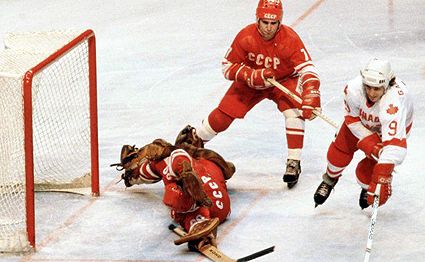
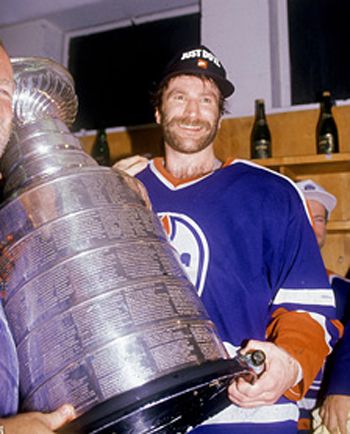
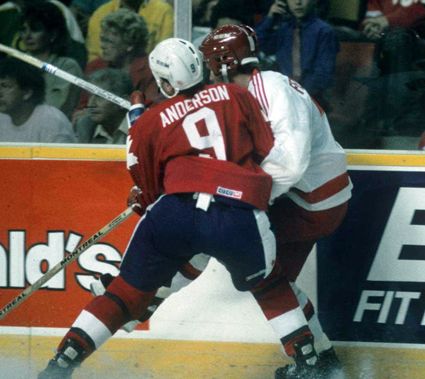
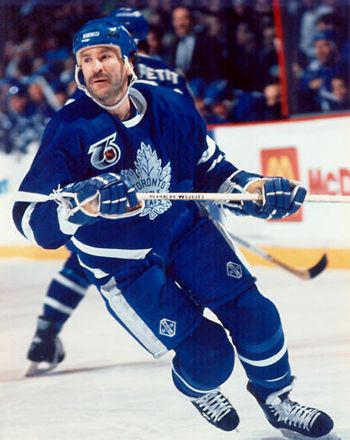
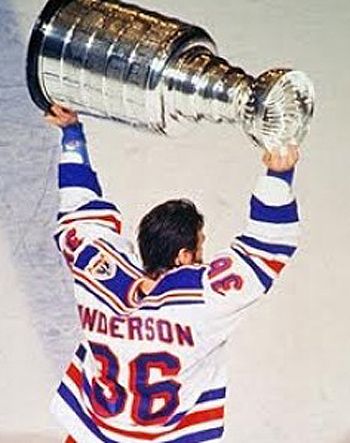
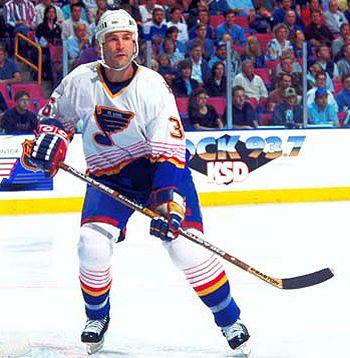
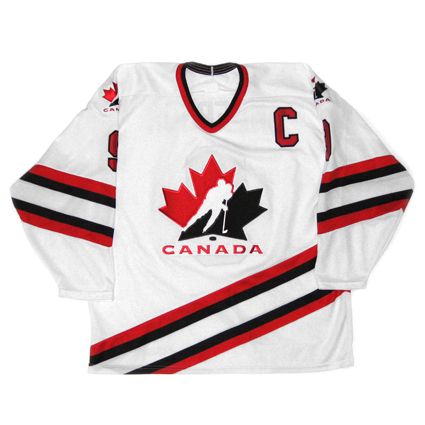
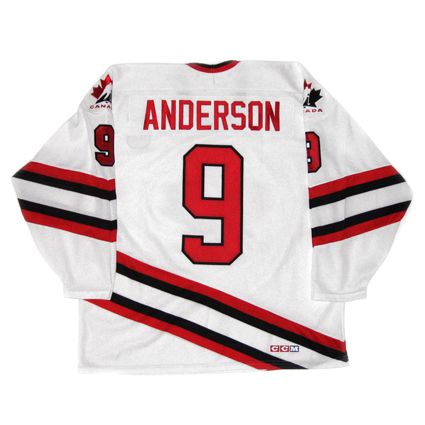










No comments:
Post a Comment
We welcome and encourage genuine comments and corrections from our readers. Please no spam. It will not be approved and never seen.